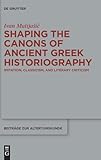Shaping the Canons of Ancient Greek Historiography : Imitation, Classicism, and Literary Criticism / Ivan Matijašić.
Material type: TextSeries: Beiträge zur Altertumskunde ; 359Publisher: Berlin ; Boston : De Gruyter, [2018]Copyright date: ©2018Description: 1 online resource (XIII, 293 p.)Content type:
TextSeries: Beiträge zur Altertumskunde ; 359Publisher: Berlin ; Boston : De Gruyter, [2018]Copyright date: ©2018Description: 1 online resource (XIII, 293 p.)Content type: - 9783110475128
- 9783110475432
- 9783110476279
- 938.007 202 23
- DF211 .M385 2018
- online - DeGruyter
- Issued also in print.
| Item type | Current library | Call number | URL | Status | Notes | Barcode | |
|---|---|---|---|---|---|---|---|
 eBook
eBook
|
Biblioteca "Angelicum" Pont. Univ. S.Tommaso d'Aquino Nuvola online | online - DeGruyter (Browse shelf(Opens below)) | Online access | Not for loan (Accesso limitato) | Accesso per gli utenti autorizzati / Access for authorized users | (dgr)9783110476279 |
Dissertation Pisa 2015.
Frontmatter -- Acknowledgements -- Contents -- Abbreviations and Translations -- Introduction -- 1 .Ancient Literary Canons from Antiquity to the Present Day -- 2. Cicero, History-Writing, and Canonical Greek Historians -- 3 .Shaping the Canons: Dionysius’ Critical Essays -- 4. In the Wake of Classicism: Dionysius, Rome, and Classical Athens -- 5. Canons Βefore the Canon: From Athens to Alexandria -- 6. Greek Historians in the Classroom: Literary Critics and Progymnasmata -- 7. From Dio Chrysostom to Late Antiquity: A Diachronic Analysis of the Canons of Greek Historiography -- Conclusions -- Bibliography -- Index of Names and Subjects -- Selective index of Greek terms -- Index locorum
restricted access online access with authorization star
http://purl.org/coar/access_right/c_16ec
The main focus of this book is the ancient formation and development of the canons of Greek historiography. It takes a fresh look on the modern debate on canonical literature and deals with Greek historiographical traditions in the works of ancient rhetors and literary critics. Writings on historiography by Cicero, Quintilian, and Dionysius of Halicarnassus are chiefly taken into account to explore the canons of Greek historians in Hellenistic and Roman Imperial Ages. Essential in canon-formation was the concept of classicism which took shape in the Age of Augustus, but whose earlier developments can be traced back to Isocrates, a model rhetor according to Dionysius at the end of the 1st century BC. The analysis explores also late-antique authors of school treatises and progymnasmata, a field where historiography had a pedagogical function. Previous studies on canonical literature have rarely considered historiography. This book examines not only the works of ancient historians and their legacy, but also the relationship between historiography, literary criticism, and the rhetorical tradition.
Issued also in print.
Mode of access: Internet via World Wide Web.
In English.
Description based on online resource; title from PDF title page (publisher's Web site, viewed 28. Feb 2023)


